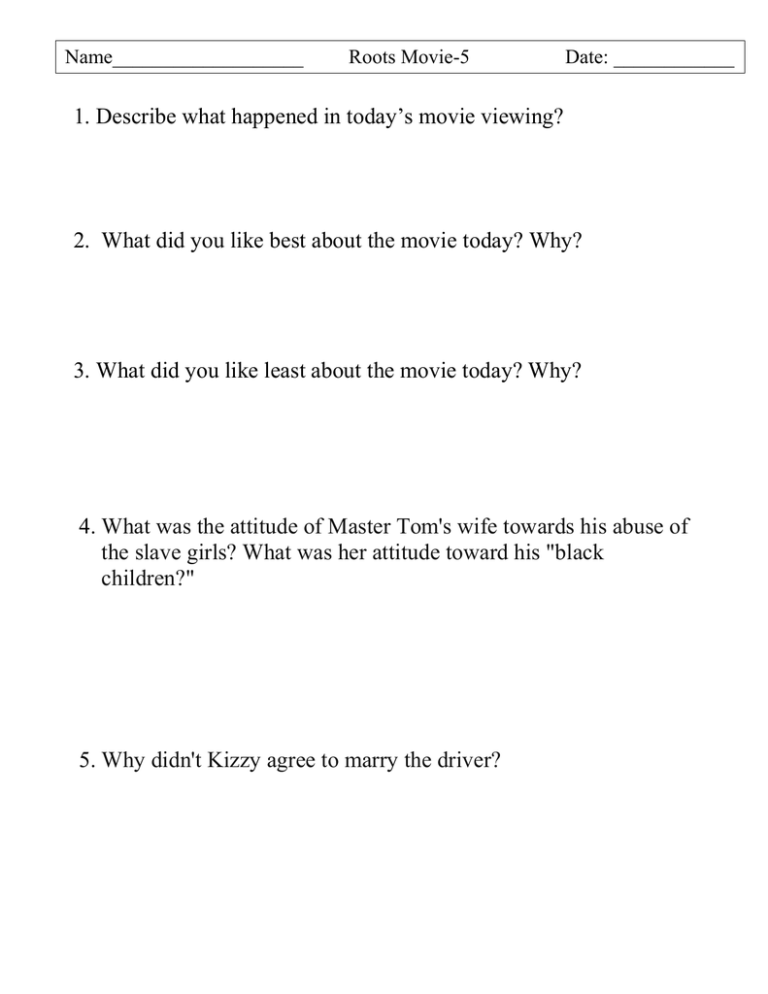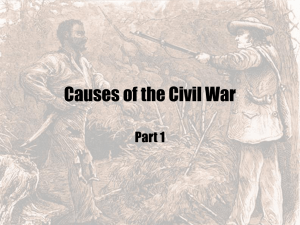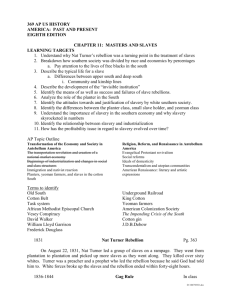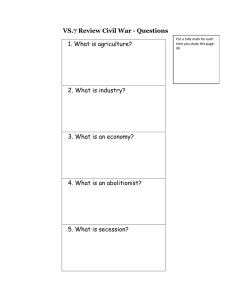Document 17869281
advertisement

Name___________________ Roots Movie-5 Date: ____________ 1. Describe what happened in today’s movie viewing? 2. What did you like best about the movie today? Why? 3. What did you like least about the movie today? Why? 4. What was the attitude of Master Tom's wife towards his abuse of the slave girls? What was her attitude toward his "black children?" 5. Why didn't Kizzy agree to marry the driver? 6. If you were Chicken George what would your reaction be to Master Tom? Remember that before he knew of his biological relationship with Master Tom, Chicken George said that Master Tom was like a father to him. Explain your answer. ____________________________________________________ ____________________________________________________ ____________________________________________________ ____________________________________________________ ____________________________________________________ ____________________________________________________ ____________________________________________________ ____________________________________________________ ____________________________________________________ ____________________________________________________ ____________________________________________________ ____________________________________________________ ____________________________________________________ ____________________________________________________ ____________________________________________________ ____________________________________________________ ____________________________________________________ ____________________________________________________ ____________________________________________________ ____________________________________________________ ____________________________________________________ Response to a Slave Rebellion - Nat Turner's Rebellion By Sharon Fabian 1 Nat Turner's Rebellion Nat Turner was an intelligent and very religious young man. He also became something of a mystery, someone who claimed to have seen visions. As an adult, he remained a mysterious figure. Many questions remain about Nat Turner to this day. 2 We do know that Nat Turner was the leader of a slave rebellion that took place in Virginia in 1831. He led a group of about 60 or 70 slaves. These rebels began at the Travis plantation where Turner was a slave. They killed the entire Travis family. Then, they moved on to other plantations. In the end, a total of about 60 plantation owners and family members had been killed. 3 4 Response to the Rebellion The first official response to Nat Turner's Rebellion was to call out the militia. About 3,000 troops were sent to capture Nat Turner and his followers. Many slaves were captured and tried in court for participating in the rebellion. A few of the captured slaves were later found innocent and set free, but many more were found guilty and executed. 5 Nat Turner himself was jailed, tried in court, found guilty, and executed by hanging. While he was in jail, a local lawyer, Thomas Gray, interviewed him. The lawyer published a book, called The Confessions of Nat Turner, which he claims was Nat Turner's true confession as told to him. In this book, he quotes Nat Turner as saying that Mr. Travis was a kind master who trusted him, and that he had no cause to complain about his treatment by Mr. Travis. He also quotes Nat Turner as saying, "my object was to carry terror and devastation wherever we went." To this day, no one knows for sure whether The Confessions of Nat Turner is really a record of what Nat Turner said, or whether it is fiction created by Mr. Gray. 6 The courts also made another decision. They decided that the plantation owners would be reimbursed, or paid back, for the slaves they had lost. 7 Many stories were spread after the rebellion. Some of the stories praised slaves who did not participate in the rebellion. Some told how slaves had been trusted with weapons, 8 and used them to save their masters' lives. Other stories about the slaves who did join Nat Turner said that they had been threatened into joining. These stories portrayed Nat Turner's Rebellion as an illegal act by a few criminals. The people who told these stories hoped that rebellion would not spread. Despite these stories, plantation owners and their families became very nervous and afraid after Nat Turner‘s Rebellion. They were afraid that the same thing might happen on their own plantation. Some people decided to take matters into their own hands. They planned and carried out acts of violence. One estimate says that about 200 slaves were murdered by mob violence in the years following the rebellion. 9 Nat Turner's Rebellion had far reaching effects. Even in other states, slaves were tried and executed, accused of being a part of the rebellion. 10 After the rebellion, southern states began to pass new laws. These laws severely limited what slaves were allowed to do. The lists of activities that were not permitted were long ones. Slaves were not allowed to vote, serve on a jury, own property, testify in court, learn to read or write, buy or sell goods, be a preacher, own a gun, meet in groups of more than five people, and many other things. The states that passed these laws hoped that they would prevent another rebellion like Nat Turner's from happening. These laws continued on through the time of the Civil War. After that they became known as the Black Codes, and they limited what free blacks were allowed to do, just as they had limited what slaves could do in the years after Nat Turner's Rebellion. 11 The overall effect of the rebellion had been to make the lives of slaves even more difficult. It also made slaves want their freedom more than ever. 12 Response to a Slave Rebellion - Nat Turner's Rebellion By Sharon Fabian Answer questions 7-13 based on the reading selection. 7. Nat Turner's Rebellion took place in _____. South Carolina Virginia Georgia Massachusetts 9. Nat Turner led a group of about _____ slaves. 60 600 500 16 11. The effects of Nat Turner's Rebellion included _____. The hanging of Nat Turner The execution of many slaves involved in the rebellion The murder of many more slaves All of the above 13. The Black Codes passed after the Civil War had their origin in laws passed after Nat Turner's rebellion. False True 8. Nat Turner and his followers attacked _____. British soldiers Government and army officials Slaves and their owners Plantation owners and their families 10. The first plantation attacked in the rebellion was owned by a family named _____. Turner Travis Gray None of the above 12. The effects of Nat Turner's Rebellion were only felt for a short time. False True


